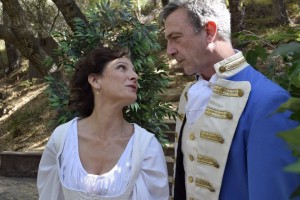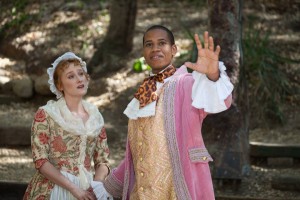Problem Play vs Crowd Pleaser: ALLS WELL and MUCH ADO – The Act Of Communication Point Of View
Katherine
Why are some plays of Shakespeare’s crowd-pleasing favorites? Why are others rarely performed and considered to be “problem plays” by scholars and audiences? And what can lawyers learn from this fact?
This summer at Theatricum Botanicum is the opportunity to have the pleasure of seeing two such plays side by side – each one a critically acclaimed and brilliantly delightful production. MUCH ADO ABOUT NOTHING has been one of Shakespeare’s crowd pleasers for centuries. If I told you right now that you could see a show about two people who start out loudly and vehemently declaring that they hate love and one another and end up falling in love with one another…well…don’t you want to see that right now?
The other is ALLS WELL THAT ENDS WELL one of Shakespeare’s “problem plays”. If I told you right now that you could see the pure vision and journey of a young woman to get the man of her dreams…and there is a lot of “stuff” around it that’s somewhat bewildering occasionally but she is a great character and you’ll walk away saying “Crazy about that Helena!”…well…don’t you see how this play is challenging?
The wonderful actress playing Helena in ALLS WELL, Willow Geer, also was the assistant director for MUCH ADO. I have gotten to speak with her this season about both experiences throughout the rehearsal and performance of both and it has really been eye opening for us both.
When I spoke to her while she was getting ready to play Helena, she said to me, “Gawd, Kathy, the language is so confusing! Getting this one into my head is so hard!” I said, “Honey, you are by yourself up there.” As brilliantly as director Ellen Geer has solved the problems and made the plots as clear as anyone I’ve seen, nothing can take away the fact that there is only one character in this play with a single bright line of journey. Playing Helena, you find yourself alone up there – even surrounded by other people talking at you and to you. That makes it awfully hard to get the lines inside your head!
When she came to assistant directing MUCH ADO Willow said to me, “So easy! So much fun! I am so jealous that I have to sit in the audience and not do this one – it is like a breeze after ALLS WELL.” Yes, it is. All the characters have bright lines and goals and the plot just points in that direction. There is nothing confusing. It is funny and satisfying and a “no brainer” since you know exactly what should happen – the lovers (who we are crazy about!) should fall in love and all should be right with the world. ALLS WELL is filled with muddled plot lines, gigantic question marks and a potentially unsatisfying love relationship. Why unsatisfying? If Helena didn’t love him so purely there wouldn’t be anything to the relationship. Bertram is basically a jerk for most of the show. More than a bit like Orsino in TWELFTH NIGHT. I always want to say to Viola (except when I played her, because the following thought is too dangerous for an actor), “Really? Of all the guys on the planet you want this whiny and depressive immature puppy? Maybe you need to consider your co-dependence issues.”
And then there are the muddled plot lines and gigantic question marks. Ellen said to me, “I don’t know why people call this a ‘problem play’ — I didn’t find it problematic.” Yeah, well…that’s because she is a genius at making sense of muddled plot lines and gigantic question marks.
One of these gigantic question marks is the character LaVatch, played by Alan Blumenfeld. Alan, like Willow, complained to me early in the rehearsal process – and since I live with him and not Willow, I got to hear it a lot more about what a bizarre character LaVatch is than about the Helena challenges. About how none of his lines made a lot of sense. About how they were basically just an unrelated series of topical jokes from the late 16th century. You know how sometimes you have to explain to someone why we thought something was funny, like the word “Bippy” from Laugh In? Okay. That was only about 40-45 years ago. Add a few centuries to that and you’ll see the problem. I didn’t remember LaVatch in the production we did in Ashland in 1975 – that’s because director Jon Jory cut the character out completely. Jory isn’t alone – this is a common thing to do when directing ALLS WELL as the character is easily simply lifted out of the plot without disturbing anything or anyone. As Alan read everything he could about the character and inquired of the scholarly theater folks we trust for answers to questions about Shakespeare – including our pal David Hammond – the “why” of the character came clear.
In Shakespeare’s company there was an actor named Will Kempe. He played a lot of the early clowns, and then was fired. Why? Because instead of sticking to the script, he would just start doing a song and dance (literally), and then crack a few jokes from his “act” (think Elizabethan Stand Up Comedian Vegas Show). He, of course, felt his public wanted to see his shtick, Shakespeare and company wanted the show to go on without interruption. Reminds me of a story I heard about how Ray Bolger – aka The Scarecrow in The Wizard of Oz. Apparently he used to spontaneously burst into “Once In Love With Amy” from his big hit “Where’s Charley?” in every curtain call in every play he ever did after that. Even after management threatened to fire him.
So Shakespeare wanted to make it up to Will Kempe and wrote the character of LaVatch especially for him. The lines are filled with bawdy and delicious 16th century humor – and — could be traded at a moment’s notice for a joke Will might come up with in his spontaneous way – without being a problem for the rest of the actors or the plot. Alan is playing him as a tribute to all the great borscht belt comedians he grew up on as a kid – and, of course, Will Kempe. He’s plays with the audience during the show, won’t “keep going” with the play until he gets someone laughing (the only time he strays from Shakespeare’s language is when he says to an audience member “Really????” – this could change though – we are early in the run), spends the intermission walking around and talking to the audience. There is a moment when Alan, in character, takes off his hat and with it his wig and there he is with his short gray hair. Alan’s fans in the audience all gasp and giggle and you can hear them say, “Oh, look! It’s Alan!” Alan, with Ellen’s guidance, has really has taken an “impossible” role and made it an unforgettable gem and audience experience.
Now…what can lawyers learn from this experience?
How often have I seen an attorney make a case a clear “no brainer” like MUCH ADO? Many times. This is the goal – make your case a “no brainer”. The “plot” must be as simple and clean as you can make it – two people who hate love and one another end up falling in love with one another. That’s MUCH ADO. How about your case?
How often have I seen a younger attorney shine in the middle of a mess of a case when she or he puts on a witness with purity of purpose and heart? Much like Helena in ALLS WELL. If you are a younger member of a trial team and you get such a chance – you and your witness can offer a beacon of light to the way of a great result.
How often have I seen a sideshow that took away from the case? A song and dance that really was distracting and took away from what needed to be put in front of the jury to make the whole case a “no brainer”? I remember a lawyer insisting once that the most important fact in a sexual harassment case was that the outrageous behavior happened in the produce section of a grocery store. Not the behavior itself, but the fact that it was near open containers of fruit and vegetables. Really? Clearly a battle I lost. That LaVatch stayed in. Dang.
TIP: How do you eliminate the extraneous in this case?

Susan Angelo and Robertson Dean

Willow Geer and Max Lawrence


